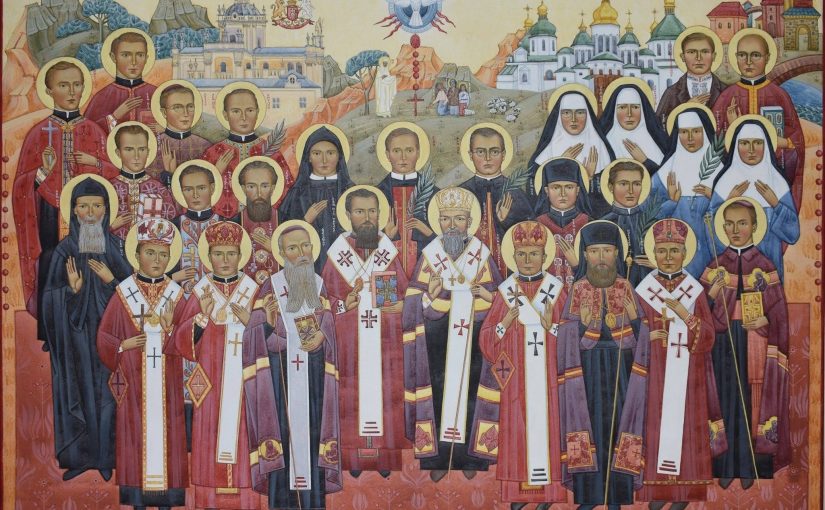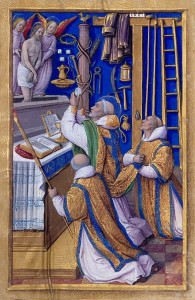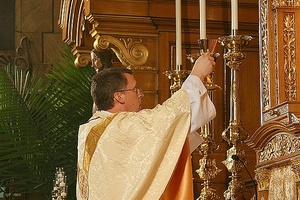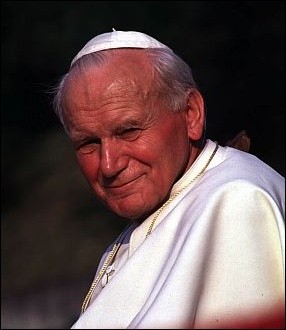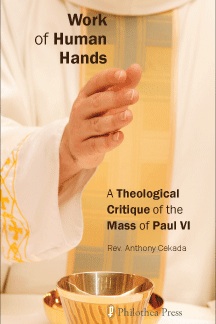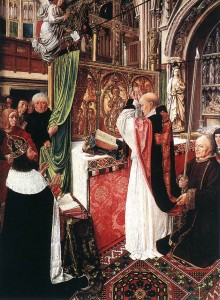 I’ve struggled with the idea that Catholic worship is ever a private affair of the priest. A conversation with a friend has sparked this post. Our Catholic liturgical life bears the burden of always being a public event. We believe that holy Mass is an act of the whole Church hence, the regulations say, that a priest ought not to offer Mass “except for a just and reasonable cause” (GIRM 254). Even when we make the serious claim that the Communion of Saints and Angels are the only ones in attendance the Church Triumphate is present. Mass, the Divine Office and the sacraments are by nature public. So, it is inconceivable that the we could hold to such ideas that hold as ‘normal’ that there is a private Wedding ceremony, a private baptism, or a private funeral. Mass, the Divine Office and the sacraments are exercises of Christ’s work in the world and the Church’s ministry.
I’ve struggled with the idea that Catholic worship is ever a private affair of the priest. A conversation with a friend has sparked this post. Our Catholic liturgical life bears the burden of always being a public event. We believe that holy Mass is an act of the whole Church hence, the regulations say, that a priest ought not to offer Mass “except for a just and reasonable cause” (GIRM 254). Even when we make the serious claim that the Communion of Saints and Angels are the only ones in attendance the Church Triumphate is present. Mass, the Divine Office and the sacraments are by nature public. So, it is inconceivable that the we could hold to such ideas that hold as ‘normal’ that there is a private Wedding ceremony, a private baptism, or a private funeral. Mass, the Divine Office and the sacraments are exercises of Christ’s work in the world and the Church’s ministry.
The General Instruction of the Roman Missal (GIRM) says, “Mass should not be celebrated without a minister or at least one of the faithful, except for a just and reasonable cause. In this case, the greetings, the introductory or explanatory remarks, and the blessing at the end of the Mass are omitted” (254).
There is a constant metaphysical sense of our Catholic worship. Thinking with the Church there are times when a priest, without a congregation and without a server (to represent the faithful) may offer Mass by himself. The Church teaches that every effort ought to be made to have a server make the responses and to keep the priest honest in following the rubrics, but there may be times when the priests needs to offer Mass only in the presence of the Angels and Saints. Remember, we do not hold that a priest owns the Mass for himself. Yet, we are also taught that a priest does not need a lay person for the proper celebration of the Mass. Traveling causes these tensions, or there is a need to offer Mass for a particular intention that needs immediate Divine assistance, e.g., the sick and dying, a special circumstance in society or church. A priest in a nursing home may offer Mass without a congregation. Bishops with a rare day free of public ceremonials may offer Mass privately from time to time. Jesuits, many monks and hermits frequently offer Mass in alone. All this seems to be contextualized by the Code of Canon Law that says, “This is true with respect to the liturgies celebrated by religious communities” (678,1). Ultimately, it is held by the Catholic Church that it is both licit and valid for a priest to offer Mass alone.
Still, what does it mean to have a public and private Mass in Church? What does the Church tell us?
With priests whose ministry is restricted, some are permitted to offer Mass privately, that is alone. Since it is the Diocesan Ordinary that regulates the celebration of Mass and sacraments, the bishop ought to state clearly that Father so-and-so is only able to offer a “private Mass at which no member of the faithful is present.” The regulation ought not leave neither the priest nor the faithful wondering what the intent of the Ordinary is on such matters.
Private has two layers of meaning: 1) alone, and 2) with a small group in a non-public oratory like a chapel in a house of nuns, or a side chapel in a church.
Clearly, we define as a “private” a celebration of not having to be done behind locked doors. Rather there is no public service announcement in social media.
What we mean as “public” ought to be defined as a celebration of the sacred Liturgy that’s made known to the faithful so that they can freely participate. Redemptionis Sacramentum (2004) states that the “public exercise of divine worship” is that which “the faithful are accustomed to frequent” (23).
In Presbyterorum Ordinis, the Second Vatican Council teaches:
In the mystery of the Eucharistic Sacrifice, in which priests fulfill their greatest task, the work of our redemption is being constantly carried on; and hence the daily celebration of Mass is strongly urged, since even if there cannot be present a number of the faithful, it is still an act of Christ and of the Church (13).
“It is necessary to recall the irreplaceable value that the daily celebration of the Holy Mass has for the priest, be it in the presence of other faithful or not” (49).
Whatever the case, there is an intrinsic value of offering the sacrifice of the Mass. Priest, whatever the form, ought to pray a thoughtful and rubrically responsible in offering Mass.
